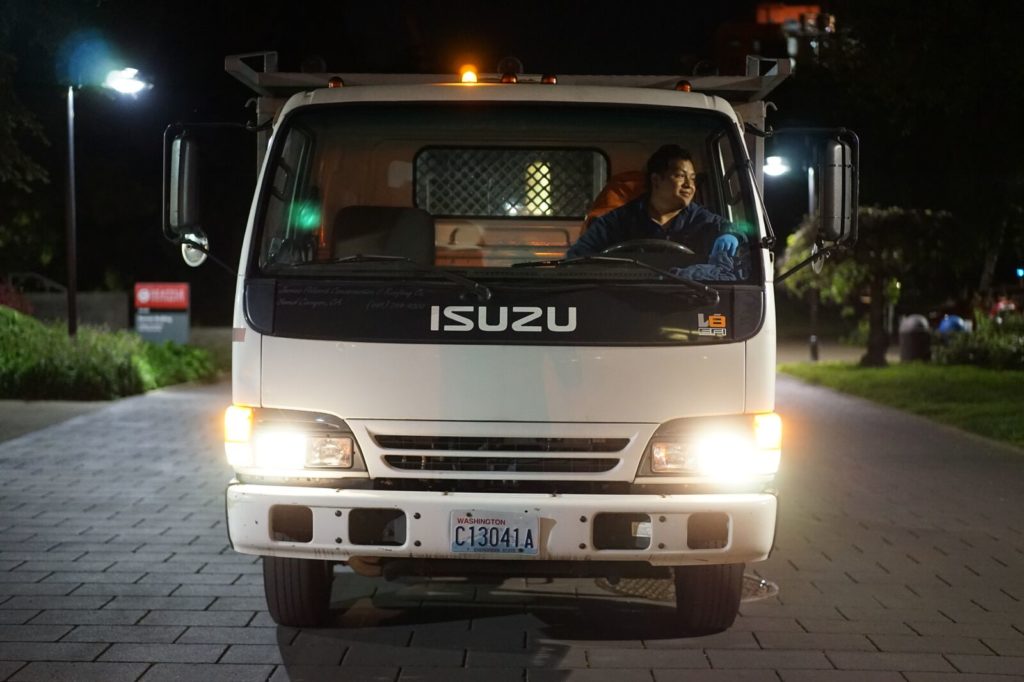“Invisible for Too Many:” Custodians Win First Union Contract
“The plan for them is looking for one janitor who they want to make a janitor-and-a-half,” Oscar Salas said, explaining the mindset of his employers. “If the janitor doesn’t like it, they can go.”
Oscar Flores Salas sat in a bright red Seattle University Luau shirt from 2007. He has worked as a WFF custodian at Seattle University for 15 years. In the last year, Salas has seen his workload increased dramatically.
For years, Oscar Salas typically worked with two other custodians on his shifts: one would collect garbage, one would collect recycling, and on Sundays the third would collect supplies and put them in the trunk of their work vehicle.
Oscar Salas is now responsible for all three of these jobs. When he asked about the company’s plans to bring someone in to fill the positions, his manager Chris told him that they were still waiting for someone else. He continued to inquire and was repeatedly told that the university had no money to spare.If he didn’t like his job, Chris said, then he could leave.
Oscar explained to Chris that he has to run from building to building across the Seattle U campus just to finish his work on time.
Oscar Salas recounted the words spoken to him when he pleaded with his manager to consider how understaffing was putting him at risk of being injured on the job.
“I don’t care. There is no money in the university. If you don’t like it the door is there for you to walk,” Oscar Salas recalls his boss telling him.
Chris communicated this eight months ago. In the time since Chris has quit and Oscar Salas is still doing the work that used to be done by three custodians.
Chris quit in November. But conditions have not improved under the new manager, Kendra.
Oscar received a written warning when he asked Kendra for additional help.
Marco Salas, Oscar’s brother, has been working as a WFF custodian at Seattle U for 14 years. Marco Salas is a multi-faceted custodian like Oscar Salas. He cleans floors and restrooms and takes out the trash, to name a few a few of his tasks. Marco Salas is often asked to wax the floors in buildings on campus as well.
One night Marco Salas was assigned to wax the floors in the Bistro. The piano there used to be in the dining area. At the time the piano didn’t have wheels, so when the university requested for the Bistro’s floors to be waxed, WFF custodians had to physically pick it up and move it.
“When we had to wax the floors in the Bistro, we had to remove the piano,” Marco Salas explained. “We had to carry it, but we couldn’t push because it doesn’t have wheels. When we moved it one time, there were four people, but that piano’s really heavy, and when we tried to move the piano, I did something to my back and after that I have had a pain in my low back.”
Even after going to the doctor and being diagnosed with a hernia that could only be removed through surgery, and getting a doctor’s note that requires him to be on light duty, Marco Salas is still assigned tasks that require him to lift heavy objects.
One year ago Marco Salas started working in the Chapel of St. Ignatius. Whenever the university requests the chapel floors to be waxed, Marco must remove all the pews himself. Despite telling his managers that it causes his back pain to flare up, they have not added additional personnel to the chapel, or removed Marco Salas from that building.
Marco Salas isn’t the only campus custodian to experience workplace injuries. Dina Sanchez, another WFF custodian with 13 years of experience at Seattle U, has reported three injuries on the job.
During one shift, Sanchez was cleaning a dumpster outside Pigott. She fell down, subsequently fracturing her arm. Sanchez went to the doctor, who put her arm in a cast and referred her to physical therapy. However, Sanchez never stopped working in this condition, and despite asking her supervisors for less work, they still assigned her the regular amount of work.
“I was crying several nights with the pain, but there was no choice. I had to be working in that pain and finish the job because if not there’s no money,” Sanchez recounted. “My hand never really got fixed because the bones couldn’t heal correctly, and now I cannot be using my hand to work like I used to before.”
Sanchez sustained another injury while working in Pigott. She was in the elevator, where she was trapped for three hours. Once the specialist arrived to fix the elevator, they were only able to provide a small opening for Sanchez to exit. She had to jump several feet out of the elevator, sustaining another serious injury to her hand.
“They are humiliated, treated like a slave, and I mean this is something happening in Seattle at this time,” said Jorge Dueñas, the vice president of SEIU Local 6, which represents the WFF workers.
There are 35 WFF custodians who work the night shift at Seattle U. The Spectator interviewed nine of these employees. All of them reported understaffing issues, and about half reported injuries while completing their shifts.
WFF Campus Custodial represents one of the two types of custodial staff at Seattle U. WFF provides services for all non-residence hall buildings. A separate entity called Residence Hall Housekeeping provides cleaning services for the university’s residence halls.
Oscar and other custodians reported that they have trouble finishing their assigned duties in the time WFF alots due to cuts to the size of their crew. A regular shift for WFF Custodian Irma Ventura includes cleaning the entire fitness center in less than three and a half hours.
The city of Seattle passed the Paid Sick and Safe Time ordinance in 2012, which provides employees in Seattle with paid sick leave. Moreno explained that because of this, on any given evening, the night crew might be down anywhere from two to five workers. This means that certain custodians do not have assigned positions, and they must cover whatever spaces on campus still need cleaning.
In addition, Seattle U continues to grow in geographical area, though the number of custodians has not proportionally increased, leaving janitors with less help to complete more buildings.
WFF Vice President of Human Resources Ricardo Moreno said he was unsure if the staff size at Seattle U had been reduced. Moreno also said that he was unaware of allegations of injuries on the job and lack of medical leave, but was aware of understaffing issues.
“It is what it is,” Moreno said. “It’s a demanding job. I can’t change the dynamic of what the job entails.”
WFF Director of Custodial Services at Seattle U Luke Wiltshire declined to comment on this matter. When the Spectator asked for comment last week, Wiltshire was on vacation. Many custodians reported being declined vacation days throughout their employment on campus.
Multiple janitors said that Wiltshire does not meet with them. Some attributed it to the language barrier, as many of the custodians only speak Spanish.
“He doesn’t talk to the workers,” Dueñas said. “He is never in the field seeing the work they are doing.”
The custodians emphasized that Wiltshire doesn’t interact with them, and Dueñas continued to speak to why the custodians’ stories have fallen on deaf ears.
“Once again because nobody sees these workers, nobody pays attention to these workers and they abuse that because they can do whatever they want, “Dueñas said. “At night there are no people, there are no police, there is nothing.”
WFF workers approached SEIU in fall of 2017 and voted to be represented by SEIU in the unionization efforts by the end of October. Since then, WFF and SEIU started negotiating their first collective bargaining agreement in November, and have been in the process of finalizing the contract for the past six months.
The Spectator attempted to reach out to the university administration for comment. Robert Schwartz, Seattle U Associate Vice President for Facilities and Connie Kanter, Chief Financial Officer and Vice President of Finance and Business Affairs at Seattle U both stated that Seattle U is not a party to the negotiation between SEIU and WFF.
On Monday, May 14, the WFF workers elected to ratify the contract which gave the custodians more protections and raised their hourly wages by 10 cents an hour. Prior to the contract custodians made $15.45, which is the city of Seattle’s current minimum wage.
And despite some workers doing twice as much work as before, the custodians only receive raises when the city of Seattle raises the minimum wage.This means custodians like Oscar, Marco and Dina, who all have worked for WFF for over a decade, make the exact same wage as newly-hired custodians.
In addition to the other issues at hand, SEIU has also advocated for more affordable health insurance for WFF workers, but were unsuccessful in the most recent round of negotiations. Nearly all of the custodians interviewed said that affordable health insurance was one of their main concerns for unionizing.
“WFF offers insurance but under the circumstances that we work we cannot afford the insurance,” Sanchez said.
WFF will continue to offer their previous health insurance, and although their pay raise was minimal, Dueñas was pleased to wrap up negotiations on their first contract. He noted: “Something that they will have is at least more respect.”
“Students can be more conscious when they see the clean table, there are faces, there are people who do that job and normally the janitors are invisible for too many,” Dueñas said. “But they are humans. They have families.”
Anna and Alec may be reached at
news@su-spectator.com.




